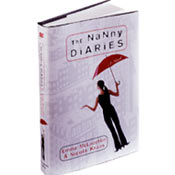
The Nanny Diaries, Emma McLaughlin and Nicola Kraus’s gimlet-eyed novel of dysfunction in the 10028 Zip Code, begins with what you fervently hope is a big fat lie: a “Note to Readers” insisting that while the authors worked as nannies for a total of more than 30 New York City families, the “characters are the product of the authors’ imagination.” Damn. The whole point of reading a book like this is to get the dirt on real people – in this case, the kind of really rich people who make you glad you don’t have a billion in the bank; and I, for one, would be inconsolable to find that the crack-addicted ex-beauty queen who has frosting fights with her 4-year-old in a vast East Sixties townhouse, or the Park Avenue fortysomething who alphabetizes her panties by designer, turned out to be products of anyone’s imagination.
Anyway, could anyone really dream this stuff up? I don’t mean the plot: This one – about a nice middle-class girl who goes to work for a seriously rich, seriously wretched family from whom she takes a lot of abuse until a liberating showdown – has worked like a charm in everything from Jane Eyre to The Sound of Music. Here, our heroine (inevitably named Nanny) is an NYU child-psych major who takes what she thinks is a part-time job looking after 4-year-old Grayer X (yes, that’s the surname) of 721 Park Avenue, only to find herself reduced to serfdom by her trophy-wife employer, who’s too busy with pedicures and “committee work” to make contact with her own child. Or, for that matter, with anyone else: She communicates with Nanny by means of exquisitely calligraphed – and exquisitely passive aggressive – notes. (“I was wondering if you could throw something together for Grayer’s dinner, since I won’t be home till eight. He loves Coquilles St. Jacques … “)
But Nanny’s story isn’t the point here. Yes, there’s the escalating conflict with Mrs. X, and yes, there’s an ongoing flirtation with a nice boy in the Xes’ building, and Nanny’s lurching progress toward graduation, to give the novel forward momentum. (That there’s momentum at all is a nice bonus: There is more writerly flair here than either the double authorship or the predictable set-up would lead you to expect.)
But the wicked fascination of this novel lies in all the wacky tidbits about life in the social stratosphere – people for whom a summer in Nantucket rather than the Hamptons is a bold step in the direction of “diversity.” The “impromptu” barbecues featuring watermelons sculpted into busts of former presidents; the highly paid “problem consultants” whom attenuated matrons must hire in order to fire their underpaid help; the Park Avenue ladies who buy studios in the same buildings as their fifteen-room duplexes so they can have “someplace for a little private time” away from little Darwin or Iolanthe – this kind of folly is irresistible to read about.
It’s worth wondering why. If “backstairs” literature – the butler’s or cook’s or governess’s eyes-to-the-keyhole account of how their rich or famous employers live – has always been popular, it’s because it serves a crucial cultural purpose: not to sell us on the haute life but, if anything, to reassure the middle classes that the best possible thing is to be middle-class. Forget about “Let them eat cake”: Books like The Nanny Diaries allow us to eat our cake and have it, too – to ogle the designer-decorated Christmas trees, the private planes, the lazy days of cappuccinos and seaweed wraps, even as we sneer at the (clichéd) inability to have warm, loving family lives. Mrs. X may have a dressing room the size of your apartment, but philandering Papa X rarely makes it home from the office. Both parents make Medea look like Mary Poppins: The attention-starved Grayer pathetically carries around his dad’s tattered business card like a totem.
I couldn’t help thinking that Grayer’s been neglected by his creators too. It’s strange, given the amount of time the authors have spent around kids, that they haven’t managed to conjure a memorable child character. This boy is sort of generically endearing – he cries and snuggles and sleeps on cue – but although you’re constantly told that Nanny’s love for the boy is what keeps her from quitting, you never really feel it. Of course, children aren’t really the point here. They are, if anything, just as much an “accessory” to the authors as they are to the emotionally frozen parents, whose overdecorated, undernourished lives are the real object of a satire whose barbs are sharp but don’t go all that deep. “I’m distracted from my thoughts of the Xes by the trappings of the Xes,” Nanny hopelessly realizes in the final pages of this very funny book. So, it would seem, are the authors; so – deliciously – are you.
The Nanny Diaries
By Emma McLaughlin and Nicola Kraus.
St. Martin’s Press; 320 pages; $24.95.
Photograph by Dasha Wright Ewing.